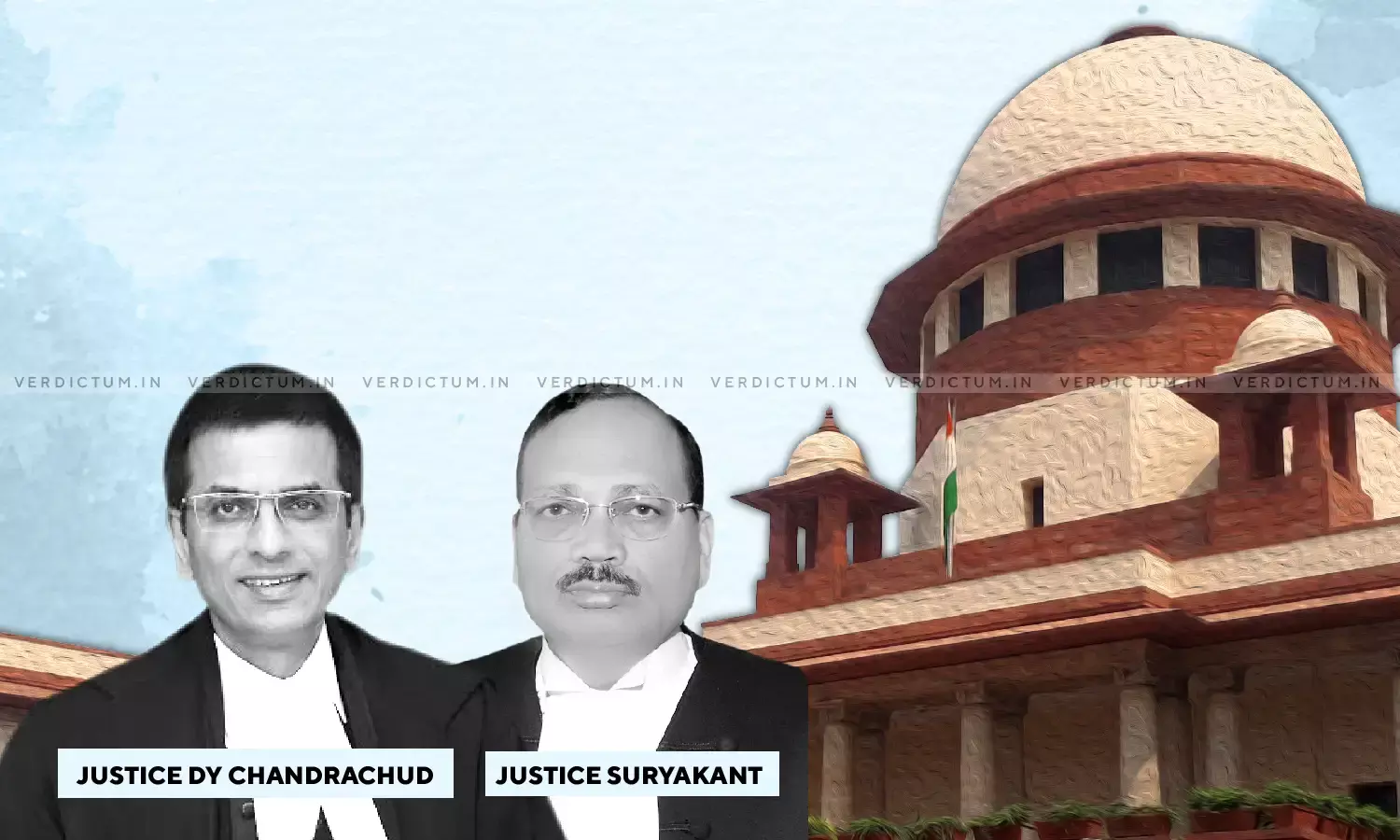Power of Preventive Detention Given to State Is Exceptional, To Be Utilised With Care - Supreme Court

A Supreme Court bench of Justice Dhananjaya Y Chandrachud and Justice Surya Kant set aside a judgment of the High Court regarding an order of detention upheld by the High Court.
The impugned order exhibited a callous exercise of the exceptional power of preventive detention by the detaining authorities and the respondent-state
Senior Counsel Mr. A Sirajudeen appeared on behalf of the Appellant and Mr. Mohith Rao appeared on behalf of the Respondents.
The Detenu was the brother of the Appellant and was an employee with a Company. A complaint was launched by that Company on the grounds that another employee, in conspiracy with the Detenu had collected an amount of Rs. 85 Lakhs from job aspirants, by misrepresenting that they would be given a job at the Company.
FIRs were filed against the Detenu for offences punishable under Sections 408, 420, 506 and 120B of the IPC. The Detenu was arrested, and then eventually released on bail, subject to certain conditions.
Later, an order of detention was passed against the Detenu under the provisions of Section 3(2) of the Telangana Act of 1986. The order of detention noted that the Detenu "is a white-collar offender" under Section 2(x) of the Act, whose offence of cheating gullible job aspirants has been causing "large scale fear and panic among the gullible unemployed job aspirants/youth and thus he has been acting in a manner prejudicial to the maintenance of public order apart from disturbing the peace, tranquillity and social harmony in the society". Additionally, the order noted the apprehension that "he may violate the bail conditions and there is an imminent possibility of his committing similar offences, which would be detrimental to public order, unless he is prevented from doing so by an appropriate order of detention".
This order of detention was challenged before the High Court in a petition under Article 226 of the Constitution through a Writ Petition seeking a writ of habeas corpus. The Bench dismissed the petition by way of the impugned judgement.
The Appellants argued before the Supreme Court that there was ex facie, non-application of mind by the detaining authority while passing the order of detention. The Senior Counsel contended that the detention was based on stale material, as the order for detention was passed almost seven and five months after the Detenu had been granted bail. It was urged by the Counsel that the ordinary course of criminal law would be sufficient to deal with the alleged violation.
The Counsel for the Respondents contended that the nature of the acts which are attributed to the detenu is a part of a series of organized activities involving white-collar crime and therefore, the order of the High Court should not be interfered with.
The Supreme Court took cognizance of the fact that the Detenu had been granted bail by the Magistrate Court previously, which indicated that the Detenu had complied with all the conditions attached to the orders granting bail.
The Court opined that by ignoring these material facts, the order of detention under the Telangana Act "suffered from a non-application of mind". The Act of passing the order seven and five months after the Detenu had been granted bail reflects that the order was based on stale material. The Court also noted that no application for cancellation of bail was moved by the investigating authorities for violation of the bail conditions.
The Court held that mere apprehension of a breach of law and order is not sufficient to meet the standard of adversely affecting the "maintenance of public order".
To that end, the Court opined that "In this case, the apprehension of a disturbance to public order owing to a crime that was reported over seven months prior to the detention order has no basis in fact. The apprehension of an adverse impact to public order is a mere surmise of the detaining authority, especially when there have been no reports of unrest since the detenu was released on bail on 8 January 2021 and detained with effect from 26 June 2021. The nature of the allegations against the detenu are grave. However, the personal liberty of an accused cannot be sacrificed on the altar of preventive detention merely because a person is implicated in a criminal proceeding. The powers of preventive detention are exceptional and even draconian. Tracing their origin to the colonial era, they have been continued with strict constitutional safeguards against abuse. Article 22 of the Constitution was specifically inserted and extensively debated in the Constituent Assembly to ensure that the exceptional powers of preventive detention do not devolve into a draconian and arbitrary exercise of state authority. The case at hand is a clear example of non-application of mind to material circumstances having a bearing on the subjective satisfaction of the detaining authority. The two FIRs which were registered against the detenu are capable of being dealt by the ordinary course of criminal law."
The Court also declined to allow any further adjournment for filing a counter-affidavit since the liberty of the citizen cannot be left to the lethargy of and the delays on the part of the state.
Therefore, the Supreme Court set aside the impugned judgement of the High Court and quashed the new order of detention and allowed the appeal.
Click here to read/download the Judgment

